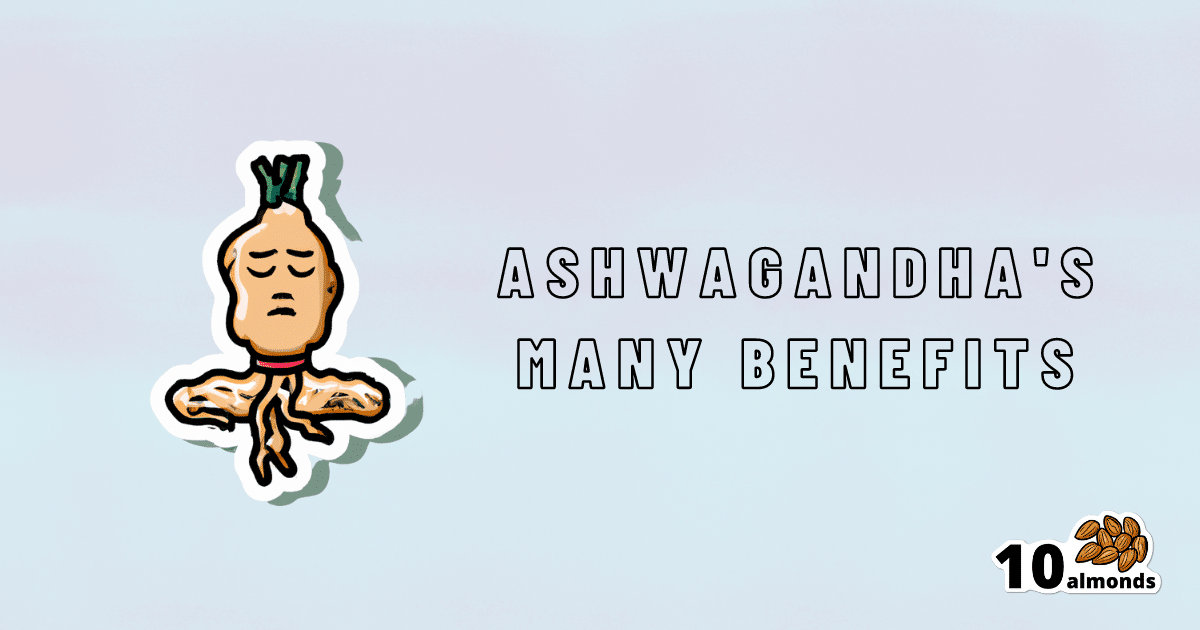Ashwagandha: The Root of All Even-Mindedness?
Ashwagandha root has gained popularity in consumer products like nootropic supplements and teas. Studies suggest it may help manage anxiety, stress, improve cognition, sleep quality, and more. Try it yourself!

Ashwagandha: The Root Of All Even-Mindedness?
In the past few years, Ashwagandha root has been enjoying popular use in consumer products ranging from specialist nootropic supplement stacks, to supermarket teas and hot chocolates.
This herb is considered to have a calming effect, but the science goes a lot deeper than that. Let’s take a look!
Last summer, a systematic review was conducted, that asked the question:
Does Ashwagandha supplementation have a beneficial effect on the management of anxiety and stress?
While they broadly found the answer was “yes”, they expressed low confidence, and even went so far as to say there was contradictory evidence. We (10almonds) were not able to find any contradictory evidence, and their own full article had been made inaccessible to the public, so we couldn’t double-check theirs.
We promptly did our own research review, and we found many studies this year supporting Ashwaghanda’s use for the management of anxiety and stress, amongst other benefits.
First, know: Ashwagandha’s scientific name is “Withania somnifera”, so if you see that (or a derivative of it) mentioned in a paper or extract, it’s the same thing.
Onto the benefits…
A study from the same summer investigated “the efficacy of Withania somnifera supplementation on adults’ cognition and mood”, and declared that:
“in conclusion, Ashwagandha supplementation may improve the physiological, cognitive, and psychological effects of stress.”
We notice the legalistic “may improve”, but the data itself seems more compelling than that, because the study showed that it in fact “did improve” those things. Specifically, Ashwagandha out-performed placebo in most things they measured, and most (statistically) significantly, reduced cortisol output measurably. Cortisol, for any unfamiliar, is “the stress hormone”.
Another study that looked into its anti-stress properties is this one:
Ashwagandha Modulates Stress, Sleep Dynamics, and Mental Clarity
This study showed that Ashwagandha significantly outperformed placebo in many ways, including:
- sleep quality
- cognitive function
- energy, and
- perceptions of stress management.
Ashwagandha is popular among students, because it alleviates stress while also promising benefits to memory, attention, and thinking. So, this study on students caught our eye:
Their findings demonstrated that Ashwagandha increased college students’ perceived well-being through supporting sustained energy, heightened mental clarity, and enhanced sleep quality.
That was about perceived well-being and based on self-reports, though
So: what about hard science?
A later study (in September) found supplementation with 400 mg of Ashwagandha improved executive function, helped sustain attention, and increased short-term/working memory.
Read the study: Effects of Acute Ashwagandha Ingestion on Cognitive Function
❝But aside from the benefits regarding stress, anxiety, sleep quality, cognitive function, energy levels, attention, executive function, and memory, what has Ashwagandha ever done for us?❞
Well, there have been studies investigating its worth against depression, like this one:
Can Traditional Treatment Such as Ashwagandha Be Beneficial in Treating Depression?
Their broad answer: Ashwagandha works against depression, but they don’t know how it works.
They did add: “Studies also show that ashwagandha may bolster the immune system, increase stamina, fight inflammation and infection, combat tumors*, reduce stress, revive the libido, protect the liver and soothe jangled nerves.
That’s quite a lot, including a lot of physical benefits we’ve not explored in this research review which was more about Ashwagandha’s use as a nootropic!
We’ve been focusing on the more mainstream, well-studied benefits, but for any interested in Ashwagandha’s anti-cancer potential, here’s an example:
Evaluating anticancer properties of [Ashwagandha Extract]-a potent phytochemical
In summary:
There is a huge weight of evidence (of which we’ve barely skimmed the surface here in this newsletter, but there’s only so much we can include, so we try to whittle it down to the highest quality most recent most relevant research) to indicate that Ashwagandha is effective…
- Against stress
- Against anxiety
- Against depression
- For sleep quality
- For memory (working, short-term, and long-term)
- For mental clarity
- For attention
- For stamina
- For energy levels
- For libido
- For immune response
- Against inflammation
- Against cancer
- And more*
*(seriously, this is not hyperbole… We didn’t even look at its liver-protective functions, for instance)
Bottom line:
You’d probably like some Ashwagandha now, right? We know we would.
We don’t sell it (or anything else, for that matter), but happily the Internet does:
Share This Post
Learn To Grow
Sign up for weekly gardening tips, product reviews and discounts.




